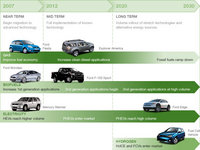Along With Alt Fuels Should We Be Changing Our Entire Transportation Culture
 |
CEO, Clean Fuels Consulting
March 1, 2010
The search for
alternatives to liquid petroleum – gasoline and diesel –
already represents a paradigm change of the status quo
‘transportation culture.’ Changing the ‘transportation
culture’ involves a different combination of fuels, technologies, and
consumer behavior, both in purchasing and selecting appropriate transport
modes for different applications in different regions. Ultimately, in the
long term, undoubtedly there will be modal shifts in transport use, new
concepts and technologies that might be ‘game changers’ in
transport, but at this time, a shift toward alternative
fuels as part of the overall fuel mix is quite enough of a paradigm
change.
Policy makers, technology and fuel stakeholders, and the public are
struggling today to make sensible, achievable and transitory choices. The
options selected should maintain (and increase) the quality of human
mobility but simultaneously maintain (and improve) environment quality,
motivate renewable options without creating additional negative effects,
and provide reliable, sustainable and secure sources of energy.
Understanding the basic ‘rules of engagement’
In the quest to change the transportation culture, there are some
fundamental ‘realities’ that should guide the choices we
make.
• Future fuels and technologies. Petroleum fuels and
internal combustion engines, with continual improvements in quality and
efficiency, will continue to dominate at least 50% of transportation
mobility for the rest of the 21st century.
• Alternatives. All the alternative fuels have their
positive attributes as well as technological and/or cost issues that remain
a challenge to their commercialization. There are no ‘fuel
panaceas’, which infers that a fundamental balance must be achieved
in the development of policies that encourage the commercial growth of the
various fuel alternatives.
• Consumer choice. Ultimately, the private and public sector
customers can make the best, informed decision possible about which of
these fuels and technologies to adopt.
• Integrated, transparent policies. Policy makers’
approach should be oriented toward policies and actions that tend to be
take an ‘integrated’ and systemic (or holistic) view in helping
to create a sustainable future for existing and new transport modes and
fuels. This means creating policies and market opportunities that often
may require the integration and balancing of economic, tax, environmental,
energy, security, and transportation policies. It also will include
consideration of agricultural policies, urban development, and management
of various urban and rural waste management activities that are intended to
capitalize opportunities for energy efficiency, energy conservation, and
increased use of renewable resources.
• Partners in politics. In ‘politics’ the
different alternative fuel stakeholders should be partners in striving for
the best, most transparent policies that advance the group of alternative
fuels. This more-or-less ‘transparent’ approach is one that
also must be consistent among government policy makers at all levels.
The time is right to achieve a balanced, European Alternative Fuel
Vehicle Policy
The motivations for a European policy focused on clean alternative
transportation fuels – and cleaner traditional fuels – have
been based on overriding concerns about energy security, environmental
protection, climate change mitigation, energy efficiency. The EU wants to
rely less on imported petroleum and more on sustainable, renewable
transportation fuels. Increasingly strict emissions regulations and other
policies are driving down vehicle exhaust pollution. Concerns about global
warming have resulted in CO2 becoming a regulated emission. But
transportation policy making since the 1980s has been based upon finding
the ‘silver bullet’ solution. As such, attempts at
‘changing the transportation culture’ have been dominated by
disjointed policies that jump from option to option; all electric in the
1980s; hydrogen fuel cells in the 1990s; then hybrids in 2000; to renewable
liquid biofuels and now, 2010, back again to all electric battery vehicles.
Meanwhile, other options like natural gas and liquid petroleum gas (LPG)
frequently have been marginalized due to enthusiasm for
‘sexier’ alternatives.
The key question is: Can the EU develop a balanced, sustainable, and
effective alternative fuels policy (with measureable results) that fulfills
the objectives of energy security and commitment to environmental
protection?
Creating a balanced approach to changing the transportation culture is
possible.
A successful alternative fuels policy must first be balanced and
transparent in order to address the key concerns of each of the main groups
of stakeholders: the consumers who will buy and drive the vehicles; the
fuel suppliers who will help to build the fuelling infrastructure; and the
OEMs who must find an economically viable pathway to develop and sell clean
fuel vehicles that can be embraced by consumers who can easily find
adequate fuelling stations on a European scale. Additionally, concerns
must be addressed to take into consideration other important societal
priorities such as: reducing the negative impacts of climate change;
reducing environmental impacts of vehicle pollution; addressing the need to
move more to renewable resources; and reducing reliance on nearly 100%
petroleum in the transportation sector. Incorporating concerns of other
integrated urban problems such as waste and water quality management adds
another benefit to a well-conceived alternative fuels policy.
The transportation culture, indeed, must change but it will be done
incrementally over a long transition. There are no ‘bridges’
to the future; there are only pathways. Identifying where we want to be,
what route to take, and following a visionary, sustainable plan is an
obtainable goal. The future is a big place and it will take a long time to
get there.
These comments are based upon and adapted from Clean Fuels Consulting
contribution to the European Commission’s Public Consultation on
the Communication on a Sustainable Future for Transport,
30 September 2009. Visit: www.cleanfuelsconsulting.org



